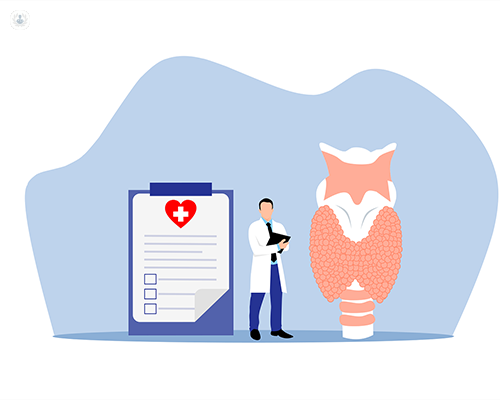Thyroid conditions: what you need to know
Written by:The thyroid gland is an important gland in the neck that can cause a range of health problems if it is overactive or underactive. In her latest online article, revered endocrinologist Dr Natasha Patel explains the causes and symptoms of thyroid problems, as well as the treatment options available.

What is the thyroid gland and what can go wrong with it?
The thyroid gland is a butterfly-shaped gland in the neck. It is an important gland that is responsible for how fast our body works. Several things can go wrong with it:
- Overactive thyroid gland – this is when the gland starts to make your body work very fast, as if you were doing a marathon.
- Underactive thyroid – this is when it makes the body work very slowly, and you will feel very tired and slow.
- Nodules – some people can be prone to developing nodules on their thyroid. This is when part of the gland overgrows. In about 5% of patients who develop a nodule, there may be a malignancy.
- Goitre – this is when the whole gland becomes a bit bigger.
How common are thyroid nodules or thyroid cancer?
Thyroid nodules are probably a lot more common than we realise. If we look at American statistics, the incidence is quite high. However, 95% of nodules are benign, with only 5% having a malignancy i.e., cancer.
What are the early warning signs of problems with the thyroid?
The symptoms of thyroid disease can be very vague, and can be muddled up with other conditions. If you have an overactive thyroid, symptoms can include weight loss and a racing heart.
When your thyroid gland slows down you will feel tired, sluggish, and prone to constipation and dry skin. If you notice you have a swelling in your neck or your voice has changed, you should seek medical advice to have this investigated further.
When should people seek medical help for their thyroid problems?
If you suffer from any of the above symptoms, you should go to your GP and they can usually do a blood test to see if you could be suffering from an over or underactive thyroid. If you begin treatment and symptoms do not improve, you may be referred to an endocrinologist.
If the GP can feel a swelling in your neck and suspect a nodule or goitre, they will refer you to the endocrinologist for our opinion.

What treatment options are available?
This depends on what we are treating:
- Underactive gland – the initial treatment will involve thyroxine. Some people start thyroxine and still may not feel great. In this case, we need to look at other factors that may be contributing to your symptoms, such as how well your gut or immune system is working.
- Overactive – treatment depends on the underlying cause. This could be an autoimmune condition you have called Grave’s disease, which needs specific treatment. Another possibility is a nodule that is producing extra thyroxine.
Can people still get pregnant if they have thyroid problems?
Yes, but this should be done under the care of an endocrinologist. There shouldn’t be a reason for you not to get pregnant, as long as your thyroid levels are controlled. It is also important to alert your maternity team if you are pregnant and have a thyroid problem, so that they can review your thyroid function regularly, as your requirements change during pregnancy. If you are struggling to get pregnant, it is worth checking your thyroid function test and discussing the results with your healthcare practitioner.
Dr Natasha Patel is a leading consultant endocrinologist based in London with over 20 years of experience. If you would like to book an appointment with Dr Patel you can do so today via her Top Doctors profile.


